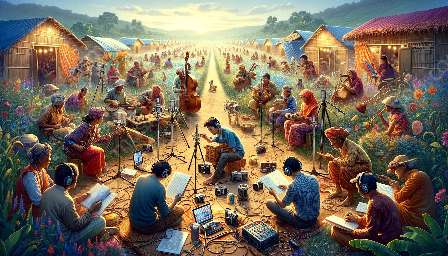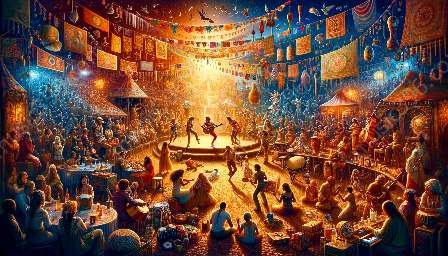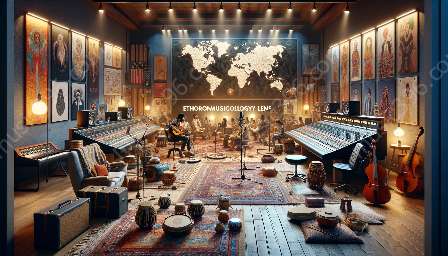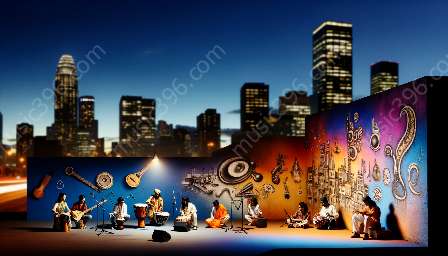Urban music cultures hold a significant place in today's society, not only as a form of entertainment but also as a medium through which issues of race and ethnicity are expressed, contested, and negotiated. Understanding the interplay between urban music cultures and identity is vital in the field of ethnomusicology, as it provides insight into the complex ways in which music intersects with social, cultural, and political dimensions.
What is Urban Music Culture?
Urban music culture encompasses a diverse range of musical genres that originated and evolved within urban centers. These genres include hip-hop, rap, R&B, reggaeton, grime, and many others, each with its unique sonic and cultural characteristics. Urban music is inherently interdisciplinary, drawing from various musical traditions, languages, and performance practices that reflect the diverse communities within urban settings.
Impact of Urban Music Culture on Race and Ethnicity
Urban music cultures have played a pivotal role in shaping and reflecting the experiences of racial and ethnic communities. Through lyrical expression, musical styles, and performance practices, urban music has become a platform for articulating the struggles, achievements, and aspirations of marginalized groups, particularly those of African American, Latinx, and diasporic communities.
Hip-Hop and Race/Ethnicity
One of the most influential urban music genres, hip-hop, emerged as a powerful cultural force in the late 20th century. Originating in the South Bronx, New York City, hip-hop provided a creative outlet for African American and Afro-Latinx youth to express their experiences of inner-city life, poverty, and systemic oppression. The genre's development and proliferation coincided with the growing awareness of racial inequality and the pursuit of social justice within urban communities. Hip-hop's rise to global prominence has made it an emblematic form of cultural resistance and solidarity for marginalized identities across the world.
Rap and Ethnic Identity
Rap music, a prominent subgenre of hip-hop, has also been instrumental in addressing issues of race, ethnicity, and cultural heritage. Many rap artists use their platform to convey powerful narratives about their ethnic backgrounds, traditions, and the complexities of navigating identity within urban environments. Through storytelling and lyricism, rap music allows for the celebration and preservation of cultural diversity while also shedding light on the discrimination and challenges faced by minority communities.
Ethnomusicology and the Study of Urban Music Cultures
Ethnomusicology, as a discipline, provides a comprehensive framework for examining the dynamic relationship between urban music cultures and race/ethnicity. By employing ethnographic methods, critical analysis, and interdisciplinary approaches, ethnomusicologists can unpack the multifaceted ways in which urban music intersects with issues of identity, belonging, and social inequality. Through fieldwork, interviews, and musical analyses, ethnomusicological studies offer valuable insights into the lived experiences and cultural expressions of urban communities.
Challenges and Controversies
The intersection of urban music cultures with race and ethnicity is not without its complexities and controversies. As urban music continues to evolve and diversify, debates surrounding cultural appropriation, authenticity, and representation often come to the forefront. Ethnomusicologists engage with these debates by critically examining power dynamics, commodification, and the impact of globalization on urban music traditions, ensuring that the voices and concerns of the communities involved are central to the discourse.
Influence on Contemporary Urban Communities
Urban music cultures exert a profound influence on contemporary urban communities, shaping cultural identities, fashion trends, linguistic innovations, and social movements. The global reach of urban music has facilitated cross-cultural exchanges and solidarity, fostering connections among diverse ethnic groups and transcending geographical boundaries. Furthermore, urban music serves as a catalyst for political activism, advocating for social change, and challenging systemic injustices through its expressive and mobilizing capacities.
Conclusion
The intersection of urban music cultures with issues of race and ethnicity constitutes a rich and multifaceted terrain for exploration within ethnomusicology. By critically engaging with the complexities of urban music expressions, ethnomusicologists contribute to a deeper understanding of how music functions as a site of resistance, negotiation, and empowerment for racially and ethnically diverse urban communities. The study of urban music cultures within the context of race and ethnicity not only sheds light on the historical and contemporary struggles faced by marginalized groups but also underscores the transformative power of music as a tool for social change and cultural expression.



































